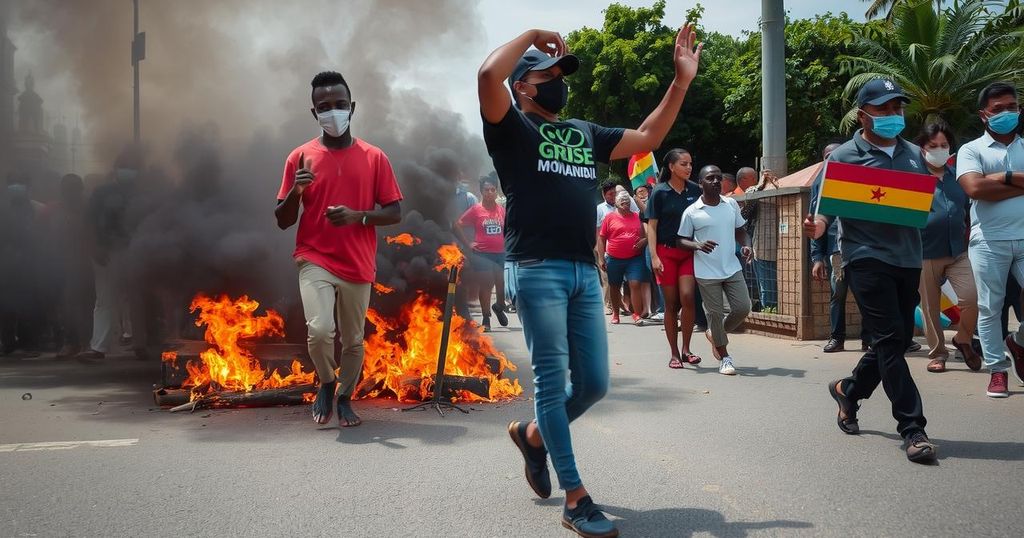Mozambique Major Cities Disturbed by Post-Election Violence

Mozambique’s major cities are experiencing severe disruptions due to post-election unrest following the recent confirmation of disputed election results. Clashes between opposition groups and police have resulted in looting, chaos, and numerous fatalities. The opposition leader attributes the violence to police actions, while calls for dialogue and restoration of order grow amid international concern.
Mozambique’s major cities are currently experiencing significant disruptions due to escalating post-election violence. Following the confirmation by the Constitutional Council of the disputed October presidential election results, public demonstrations and unrest have surged. Businesses, including banks, remain closed in the capital city of Maputo, while transportation and trade activities have ground to a halt amidst ongoing protests led by opposition groups.
The ruling Frelimo party, which has maintained power for almost fifty years, was reaffirmed by the court after Frelimo candidate Daniel Chapo was declared to have earned 65% of the vote, despite initial counts suggesting nearly 71%. The announcement spurred widespread unrest, with demonstrators engaging in looting and confrontations with police, resulting in injuries and fatalities. Reports indicate that over 248 lives have been lost in the violence, including the tragic deaths of 33 individuals during a prison break.
Witness testimonies have described chaotic scenes in neighborhoods such as Praca dos Combatentes, where looters targeted homes and businesses. One resident recounted the destruction, stating, “The people I saw ran away and broke glass. I saw everything that was happening. They took microwaves, televisions, beds. This should not happen because they are ruining many things…” Furthermore, in the George Dimitrov area, at least 11 people died when a food warehouse was set ablaze following an attack.
Police have reported a severe breakdown of order, with some local communities erecting barricades in protest. Opposition leader Venancio Mondlane has blamed police for inciting violence and death, highlighting the complicity of law enforcement in the unrest. He has called for continued protests but has urged his supporters against looting, expressing that the people are simply responding to dire conditions. Meanwhile, the UN has voiced its concerns and is advocating for dialogue and peaceful resolution to avert further deterioration of the situation.
The recent uprisings reflect deepening political tensions in Mozambique, where calls for reform and dissatisfaction with the current governance under Frelimo continue to mount. As the crisis unfolds, there remains an urgent need for a concerted effort by all parties involved to restore civil order and adhere to the principles of democracy.
The unrest in Mozambique follows the confirmation of election results that many citizens contest, marking a significant chapter in the country’s political landscape. Frelimo has been the ruling party since independence in 1975, and the recent electoral outcomes have ignited public outcry, revealing widespread dissatisfaction and frustration with ongoing governance issues. The violent protests in response to these results indicate potential underlying social and economic grievances that need to be addressed.
In summary, the current unrest in Mozambique signifies a troubling period for the nation, characterized by violence and widespread discontent following disputed election results. The situation calls for immediate dialogue and substantive political engagement to mitigate the violence and restore order. The international community, including the UN, is urged to facilitate discussions among political leaders to achieve a peaceful resolution that addresses the citizens’ aspirations for democracy and stability.
Original Source: www.dw.com







